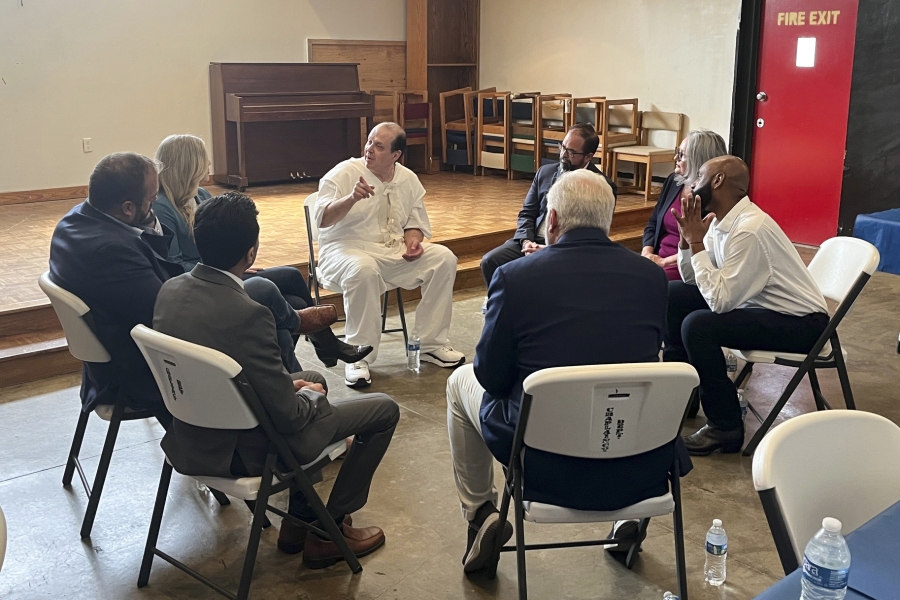
On Thursday night, the Texas Supreme Court handed down an extraordinary order saving Robert Roberson from execution — but potentially not for very long.
Roberson was convicted in 2003 of murdering his daughter on the theory that she died of “shaken baby syndrome.” However, in an extraordinary turn of events, it now appears likely that Roberson is innocent. Not only that, but it is far from clear that his daughter was even a victim of murder in the first place.
SCOTUS, Explained
Get the latest developments on the US Supreme Court from senior correspondent Ian Millhiser.
Email (required)Sign UpBy submitting your email, you agree to our Terms and Privacy Notice. This site is protected by reCAPTCHA and the Google Privacy Policy and Terms of Service apply.
One reason to doubt the conviction is that modern science looks at shaken baby syndrome with increasing skepticism. More importantly, however, the evidence in Roberson’s case suggests that his poor girl actually died from a combination of pneumonia and medications that should never have been prescribed to such a young patient, and that the injuries that a 2003 jury attributed to child abuse may have resulted from a surgery.
Another reason why the order in In re Texas House of Representatives is so extraordinary is that it involves what may be an unprecedented conflict between the state’s legislature and its governor. Texas Gov. Gregg Abbott (R) has the power to issue a 30-day pause on Roberson’s execution (although not to grant him permanent clemency) but has thus far refused to do so, and the state intended to execute Roberson Thursday night.
The day before, however, a bipartisan group of state lawmakers issued a subpoena seeking Roberson’s testimony before a committee of the state’s House of Representatives. This hearing isn’t scheduled until Monday, and Roberson obviously could not comply with this subpoena if he had been killed Thursday night.
So Roberson’s case raises what may be a unique separation of powers issue under the Texas Constitution: Can Texas’s executive branch of government carry out an otherwise lawful execution if doing so would prevent its legislative branch from hearing testimony from a witness it has already subpoenaed?
Roberson’s case has proved to be divisive within Texas’s Republican-controlled government
The Texas Supreme Court’s order in Texas House has nothing to say about whether or not Roberson is innocent. Indeed, the state Supreme Court isn’t ordinarily allowed to weigh in on criminal appeals at all — those are handled by an entirely separate court known as the Texas Court of Criminal Appeals, which has repeatedly denied relief to Roberson. Nor did the state Supreme Court definitively rule on whether the House’s subpoena can halt an execution.
Instead, in a concurring opinion joined by two other justices, Justice Evan Young explains that he voted to temporarily halt Roberson’s execution in order to give the courts time to figure out what is supposed to happen in the unusual circumstance when the legislature seeks testimony from a death row inmate on the eve of his execution.
“We do not have clear precedent on this question,” Young writes, which is unsurprising given the highly unlikely situation that led to this case coming before his court.
Two other aspects of the case are worth noting. One is that this case has pitted many of the states’ Republicans against each other. While Abbott, who has yet to intervene on Roberson’s behalf, is a Republican, so too are the two Texas lawmakers who introduced the resolution to subpoena Roberson. Every justice on the Texas Supreme Court is a Republican, as is every judge on the Court of Criminal Appeals, which most recently voted 5-4 to deny relief to Roberson.
The other aspect is that Roberson’s fate likely rests with Texas’s Board of Pardons and Paroles, which already voted once on Wednesday not to recommend clemency for him. If this board recommends clemency, Abbott may commute Roberson’s death sentence altogether. Without a clemency recommendation, however, Abbott can only delay the execution by 30 days.
For now, Roberson’s attorneys are trying to buy him time. At most, the legislative subpoena may prevent Texas from rescheduling his execution until after Monday, when his testimony is supposed to occur. Then it’s likely up to Abbott to grant him another 30 days to convince the pardon board to reverse its decision.
The striking thing about this case, however, is that virtually everyone who has touched it wants Roberson to live except for the few people in Texas’s government (the Court of Criminal Appeals, the pardon board, and Abbott) who actually have the power to save him. One of Roberson’s advocates is Brian Wharton, the lead detective in his case who now believes he is innocent.
Another is US Supreme Court Justice Sonia Sotomayor, who penned a 10-page statement explaining that the US Supreme Court is unable to intervene because Roberson does not claim that any of his rights under federal law are being violated. Yet, while Sotomayor agreed that she is powerless because Roberson “presents no cognizable federal claim,” her statement practically begs the state officials who can actually save Roberson’s life to do so.
“An executive reprieve of thirty days would provide the Texas Board of Pardons and Paroles with an opportunity to reconsider the evidence of Roberson’s actual innocence,” Sotomayor writes at the end of that statement. “That could prevent a miscarriage of justice from occurring: executing a man who has raised credible evidence of actual innocence.”
Source: vox.com